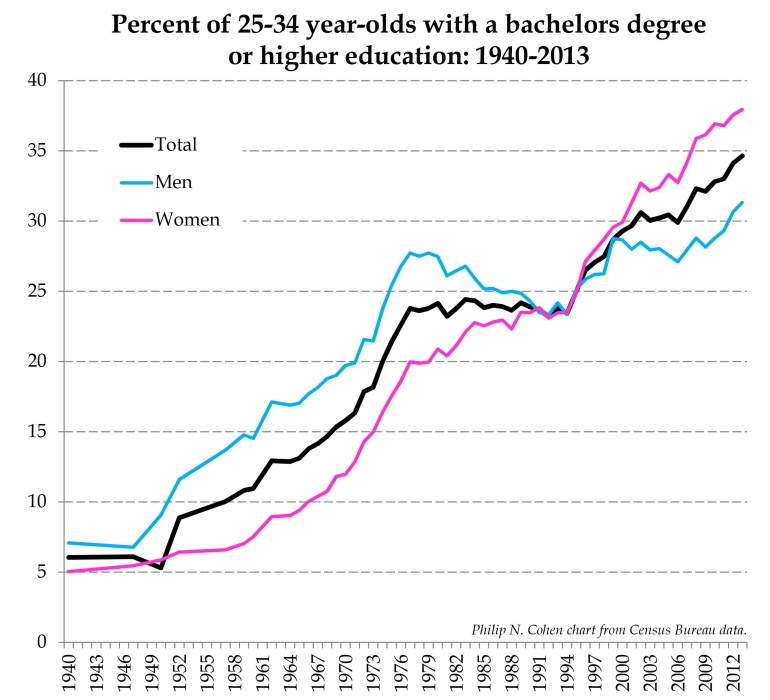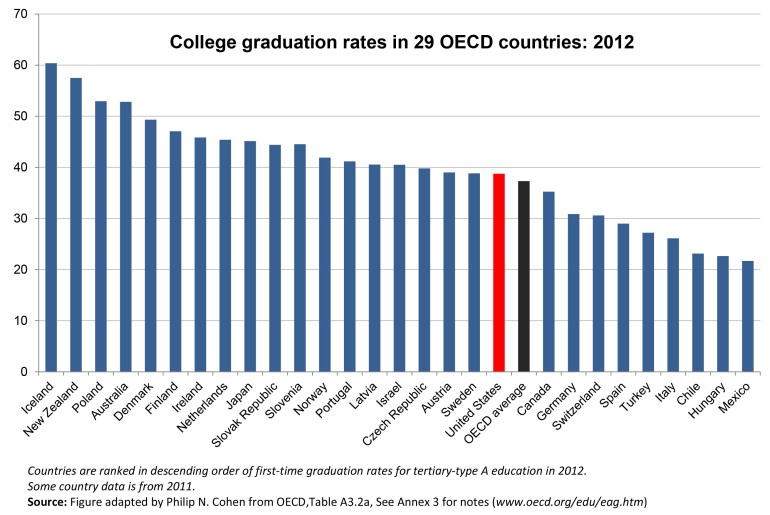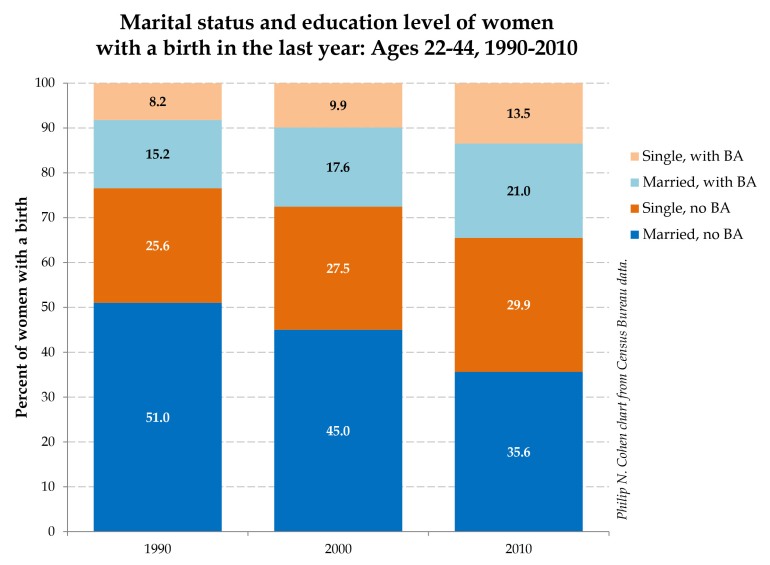Here are three ideas I disagree with:
1. Most people aren’t smart enough to make going to college worth it.
Maybe the best-known purveyor of this idea is Charles Murray, who argued in his 2008 book Real Education (offshore bootlegged copy here) that the “consensus intellectual benchmark” for understanding real college-level material is an IQ of 115, which by definition is only 16% of the population — but probably only 10% are really, truly smart enough (and efforts to improve education at lower levels to prepare more people for college are futile, so don’t even think about spending more on education, because so many people are “born lazy“).
2. We’ve done so much for poor people, it’s time for them to do something for themselves.
This is clearly related to idea #1, insofar as the government spends billions of dollars educating people for college — and subsidizing the colleges they attend — who could instead just work hard and enjoy life in a job requiring less education. But it extends to all kinds of social welfare and anti-poverty programs, as illustrated by the exasperated people in the policy establishment from Brookings to Heritage.
3. Poor women should get married before they have children.
This idea is pervasive, as I’ve discussed many times under the single mothers tag, in response to people blaming single mothers for rising inequality, poverty, low upward mobility, and crime.
One response
Here I offer one response to these three ideas combined. It is possible to increase access to college education, which would increase stability and opportunity for poor people and their children.
In demography, there is a long-running debate over whether there is a biological limit to human longevity, and whether and how fast we may be approaching it. Regardless of the ultimate answer, so far it’s clear that projections based on an inevitable tapering off of increases in life expectancy have repeatedly proved wrong (here’s a review and a recent paper). The same might be said of college education. Here is the trend in 25-34 year-old U.S. civilians with at least a BA degree, from Census numbers:
There was more talk about hitting the limits of college access 10 years ago, but even then it was increasing rapidly among women. Yes, we can and should improve college education. But I see nothing here to suggest a ceiling approaching. Still, people keep assuming that expanding education isn’t feasible.
For example, while Murray holds forth on the intelligence limitations among the poor, his colleague Brad Wilcox argues for a cultural press on those with less than a college degree:
They can go down the road of not having marriage as the keystone to their family formation, family life, or we can hold the line, if you will, and try to figure out creative strategies for strengthening marriage in this particular middle demographic in the United States.
In addition to upscaling their deficient values, however, couldn’t we also move them out of the less-than-college category altogether? Not so fast, says Wilcox in a recent interview:
On the education front, the U.S. spends a ton of money and devotes unparalleled attention to college. But the reality is that only one-third of adults, even today, will get a college degree, a B.A. or B.S. We can do a lot better in both funding and focusing on vocational education and apprenticeship training.
Really, America, be reasonable: Our “ton of money” is “unparalleled.” Don’t set your sights too high. Who do you think you are, anyway, Poland (college graduation rate: 53%), Ireland (46%), or Portugal (41%)? From OECD numbers:
I know expanding college access (the real kind, not the for-profit kind) suggests expanding a broken financial aid system, and the economic returns aren’t guaranteed, but for my purposes it’s not just about getting a better job. People who go to college — and those who know they are going to go to college before they do — usually delay having children, not because some moralizing think tank tells them it’s wrong, but because they’re trying to rationally sequence their lives. Of course, married couples have relatively low poverty rates, but even for parents who aren’t married, higher education sure helps. From the American Community Survey via IPUMS.org:
Trying to get more poor people to get married is both offensive and useless. But increasing access to higher education is both uplifting and useful. The choice between early birth with low education and later birth with higher education is not hard to make, but unless it’s feasible — with a readily apparent, practical, path toward completion — there is no choice to make.
The increase in college education has already helped keep child poverty levels from rising as marriage rates have fallen. Among women old enough to have finished college (ages 22-44) the percentage of babies born to mothers with college degrees (married or not) has increased from 23% in 1990 to 35% in 2010. From the Current Population Survey via IPUMS.org:
Promoting marriage among the poor is a moralizing salve for the self-esteem — and anti-tax self-interest — of pious elites, with zero proven success in helping anybody poor. Promoting access to higher education is good policy and good politics.





I love how they mention “apprenticeship programs.” What they mean is “apprenticeship programs that are very short-term, and completely separate and apart from a union hall”—in other words, the kind of programs that cost their applicants money without improving their knowledge base or income. Say what you will about college graduates; a college degree really does improve a person’s knowledge base, future earnings, and ability to get hired (and reduces the time a person will spend unemployed).
Meanwhile, a cursory look at “the books” at any trade union’s hiring hall will readily show that the postindustrial economy is piss-poor with employment opportunities for trade workers. “Apprenticeship programs” won’t employ an adequate number of people if there aren’t manufacturing centers for them to work in. Offices and shopping centers don’t employ very many trades workers. Factories and utilities (power plants, refineries) do.
LikeLike
” It is possible to increase access to college education, which would increase stability and opportunity for poor people and their children.”
This “increasing access” is a terrible idea for two reasons:
1. College grads are having just a terrible time finding jobs in 2007-2014. See “http://www.newyorkfed.org/research/current_issues/ci20-1.pdf”
2. Providing access is just a word for feeding loan money into universities and into the pockets of faculty. Colleges look for certain level of cognitive ability; This has three further outcomes:
(a) Significant percentages of students need remedial education in college.
(b) Graduates have no ability to find jobs post-graduation because universities do not train them
(c) Grads get channelled into even more higher education such as law and MFA programs, with diminishing returns.
There is another outcome of “increasing college access for all”; grads do not take up jobs which are considered beneath them. As an example, there is a significant demand for oil and gas workers in the last several years, but no college grad will touch them because of the hardscrabble nature of work; including remote locations, long hours, and camp-like living conditions. I am paying between 120 K and 150 K for operators in Kansas and ND, and I get no response to ddvertsiments.
Please have a look at “http://nces.ed.gov/programs/digest/d12/tables/dt12_313.asp”; increase d degrees have not meant in areas that the world is looking for.
Separately, someone above crapped all over vocational skills in an earlier response. The union halls ability to control hiring disappeared during Reagan administration. There is a tremendous demand for skilled and vocational trades in the last 20 years that has been mainly filled by Mexican and central American workers. We should look at the way German and Scandinvian nations have expanded vocational programs.
“Increased college access idea ” is chimera noo ne else except liberal arts professors believe.
LikeLike
I do appreciate that the economic returns are not so simple. But it’s not just about a job. And if college students need remedial education, then that means they need education, not that they don’t need education. Of course improving schools at lower levels is crucial.
LikeLike
“Someone” above? Do you have a hard time addressing me by name, vijay? Is it the fact that I’m a tradesperson or the fact that I’m female that’s giving you the vapors?
No, the hiring hall has not disappeared; outside of the south, it’s still the norm. The fact remains that there isn’t enough trades work to go around, and won’t be until manufacturing makes a return. A ready-made solution exists in the form of middle-class wages and benefits for service-industry workers. Until then, most people (including most tradespeople) are going to advise their own children to go to college, because it gives them much better life chances and opportunities than low-wage, no-benefit service industry employment.
LikeLiked by 1 person
Vapors? Tradesperson? female giving vapors?
Manufacturing has, in a limited sense, attempted to make a return, along with cheaper energy. However, there is no place in the modern US, with a very limited subset of people who have been trained for it, and local governmnt policies which discourage location of manufacturing in the backyard.
Read “http://nces.ed.gov/programs/digest/d12/tables/dt12_313.asp”. The number of engineers has increased by 50% in the last 40 years, less than the population growth (60%), but the number of business majors, healthcare majors etc has increased by a factor of three. I am a person who is trying to hire for projects, but get very few bites except from hispanic tradesmen. The trade class has been hollowed by Reagan administration and beyond.
In any case, most people are encouraging their children to go to college, not in any altruistic sense of higher learning, but with a view of their kids as “lemmings” who need not follow their paths. The United States has the highest living standard in the world.
I was not laughing until the last line. Most university grads are going to low wage no-benefit service industry employment in the last 5-10 years. I am saying why not cut out the middle man.
LikeLike
Vapors or something. I’ve noticed in my occasional lurking that you tend to remember screen-names and address other commenters directly. It struck me as highly unusual that you could neither remember my name nor address me as if I were contributing to the thread despite my being the only respondent thus far. Only you can tell me why you departed from your usual protocol; in my experience, sexism is number-one with a bullet in such instances.
Be that as it may, I’m certainly willing to follow any link you can provide to hard stats demonstrating that college provides no earning advantage over a high school diploma, let alone no lifetime earnings advantage or opportunity advantage. I’m confident no such stats exist.
College graduates earn anywhere from 1.3 to 1.5 million dollars more over the course of a lifetime (on average) than those with only a high school diploma.
LikeLike
“Most university grads are going to low wage no-benefit service industry employment in the last 5-10 years”. Depends what you mean by “low wage.” I don’t have the benefits data, but the earnings data, from the 2013 ACS, for 25-29 year olds, working full time, compare BA/BS-only degree holders to those with less education:
Men: BA/BS-only / Less than BA/BS
25th percentile: $34000 / 21,600
Median: $48,500 / 30,000
75th percentile: $66,000 / 42,000
Women: BA/BS-only / Less than BA/BS
25th percentile: $30,000 / 19,000
Median: $40,600 / 25,000
75th percentile: $55,000 / 35,000
Many college grads are not rich, but most are earning more than 2x the poverty line for a family of 3. And they’re earning way more than those with less education.
LikeLike
And their jobs usually come with benefits like health care, paid sick leave, paid vacation, pension or retirement contributions. Sometimes more. They also usually receive more respect on the job than people without higher education. They’re given more opportunities for advancement and more authority in carrying out the duties of their job. There usually isn’t the level of micromanagement given to workers with less education, and particularly not of the invasive kind (drug testing, locker/purse searches, pat-downs, etc). Non-monetary benefits also have value.
LikeLike
Thanks for this post. I didn’t realize that the US was lagging so far behind other rich countries in providing meaningful access to higher education. A better educated populace would participate more in politics and make better decisions–regardless of economic outcomes. And, even as we know that recent college grads often have a hard time folding into the workforce, college grads are doing better than non-grads.
LikeLike
The figure “Graduation rates in OECD countries” is not what it is intended to b. In the Unite States it represents first time college grads; however, in most European countries it does not represent the same; You can figure that out by looking at the number of Four year university “seats” available in say, Ireland, or Portugal or Poland. That number is typically between 20-40% of the high school graduating population in most EU countries.
My final point is just that we should avoid the following logic:
1. The United States is an economically advanced country.
2. We attained this position by graduating 40% of our high school seniors through college.
3. People who go to college get a good income, marry late, and have fewer children, later in life.
4. Hence, if we put 80% of seniors through college, we will be oubly happy.
This is a prime example of dysfunctional logic, and referred to as correlation dos not imply causation.
LikeLike
Angela, what I have not liked is to blame single mothers for inequality in the society, instead the run way fathers should be held responsible, for sure the single mothers are doing their best.
LikeLike
Apparently, American women already agree with your advice. When looking just at women, the college grad rate in the U.S. ranks more favorable with other OECD countries. Also, sending more people to college is good for the economy in another way: it lowers unemployment.
LikeLike
Oh look: the Bureau of Labor Statistics thinks that getting a college education is a good deal, too. Average weekly earnings for a high school graduate: $651. Average weekly earnings for someone with a bachelor’s degree: $1,108. Much higher unemployment rate for those with only a high school diploma as well.
LikeLike
Well, you can increase the graduation rate in two ways.
a) By increasing level of lower education
b) by lowering the standards of who can graduate.
The second option is much easier and my impression (as a guy working in Polish university) is that the second option is usually picked on by people trying to reform the education (at least here in Poland).
Unfortunately, by following b) you create a reality in which a lot of poeple with diplomas are unemployed, while at the same time there could be shortage of workers in certain fields not requiring the diplomas.
LikeLiked by 1 person
s/increasing level of/increasing quality of/
LikeLike
What is proposed in here is neither; increasing access in US universities is interpreted as meaning enrolling students in significant numbers by reducing or eliminating entry barriers such as SAT, GPA, and other requirements. However, since the tuition increases continuously, the proposed scheme is just a method to transfer government money (with students as loan conduits by Sallie Mae) to university administration and faculty salaries.
However, research has shown that cognitive ability in populations is distributed (normal distribution or otherwise), and only a segment of the population can make use of university education. This is no insult to the population; as such, I have argued that the demands of vocational work, in the present day, are harder than college education.
Something similar to what has been proposed here, has been attempted in US law schools; the law schools continuously reduced LSAt and GPA barriers, while simultaneously jacking up tuitions. The result is huge law grad unemployment and saturation; something close to 100 billion has flown into law school coffers while graduates unemployment rate has been about 45% or close to 23,000 unemployed lawyers a year. The tide is turning for the last few years with law school enrollment dropping.
I foresee a similar skyrocketing of undergrad loans, and increasing college grad unemployment in the near future.
LikeLike
Whats being reflexed in the numbers is what related to success in marriage people with more education tend to have higher intelligence than those with less education More education generally means more job stability and higher wages salaries in the workplace this means more social stability in marriage
LikeLike